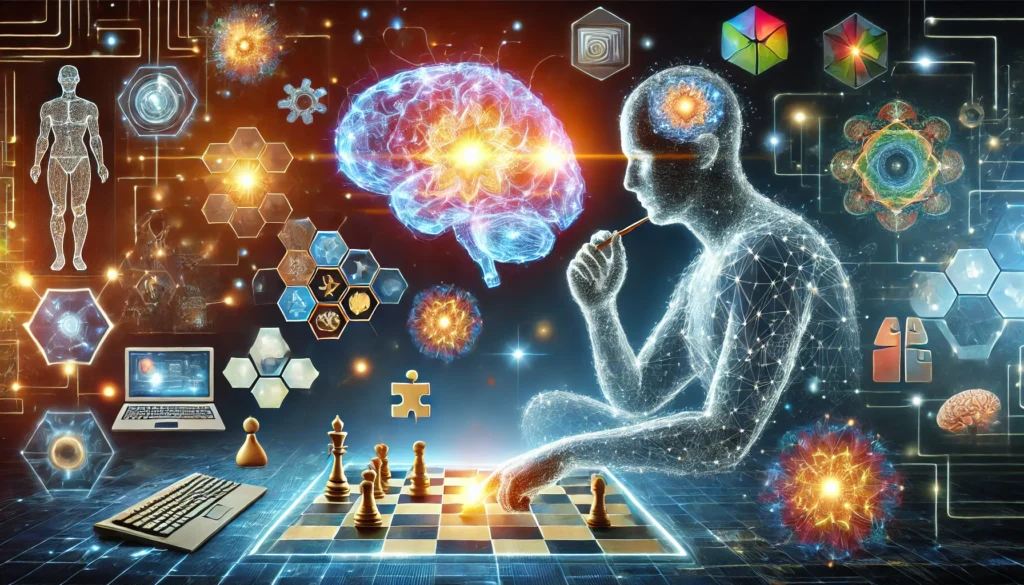Cognitive skills are the mental capabilities that enable us to process information, learn, remember, reason, and concentrate. These skills are fundamental to performing everyday tasks and are critical for problem-solving, decision-making, and learning. As we age, maintaining and enhancing these skills becomes even more essential.
You may also like: Top Herbs to Enhance Your Focus
The Components of Cognitive Skills
Cognitive skills encompass a wide range of mental processes. These include perception, attention, memory, language, and executive functions such as planning and problem-solving. Each component plays a unique role in how we interact with the world and respond to various stimuli. Understanding these components can help individuals identify areas for improvement.
The Importance of Cognitive Skills
Cognitive skills form the backbone of our ability to function effectively in society. They impact everything from our ability to learn new information and solve problems to our capacity to focus on tasks and interact socially. Improving these skills can lead to better job performance, academic success, and overall life satisfaction. Moreover, cognitive skills are closely linked to emotional intelligence, influencing our ability to manage emotions and build relationships.
Historical Context
Historically, cognitive enhancement was often associated with academic and professional success. Ancient philosophers like Plato and Aristotle emphasized the importance of mental acuity, while modern-day scientists continue to explore ways to enhance these abilities through various means, including education, lifestyle changes, and technological advancements. The evolution of cognitive enhancement reflects a growing understanding of the brain’s plasticity and the potential for lifelong learning and adaptation.
Strategies for Enhancing Cognitive Skills
Enhancing cognitive skills involves a multifaceted approach that includes lifestyle changes, mental exercises, and sometimes, dietary adjustments. Let’s explore some effective strategies:
Physical Exercise
Physical exercise is a well-documented method to boost cognitive function. Activities such as aerobic exercise and strength training have been shown to increase brain volume in regions associated with memory and thinking. Regular physical activity enhances the production of neurotrophic factors, which promote the growth and survival of neurons. Moreover, exercise increases blood flow to the brain, delivering oxygen and nutrients that are vital for brain health.

Mental Exercises
Mental exercises like puzzles, crosswords, and brain games are excellent for sharpening cognitive skills. These activities stimulate the brain, encouraging the formation of new neural connections and improving overall brain function. Engaging in activities that challenge your brain can slow down cognitive decline and improve mental agility. Regularly changing mental exercise routines can prevent boredom and ensure that different areas of the brain are engaged.
Nutrition and Diet
A balanced diet rich in antioxidants, good fats, vitamins, and minerals provides energy and aids in protecting against brain diseases. Foods like berries, fatty fish, and green leafy vegetables are particularly beneficial for cognitive health. Additionally, staying hydrated is crucial as dehydration can lead to cognitive decline. Including foods that are high in omega-3 fatty acids, such as walnuts and flaxseeds, can support brain cell health and improve communication between neurons.
Sleep
Adequate sleep is essential for cognitive health. During sleep, the brain consolidates memories and clears out toxins that accumulate during the day. Poor sleep can impair attention, alertness, concentration, reasoning, and problem-solving, making it crucial to establish a regular sleep schedule and create a restful environment. Techniques such as reducing screen time before bed and creating a consistent sleep routine can significantly improve sleep quality.
Stress Management
Chronic stress can have detrimental effects on cognitive function. Stress management techniques such as meditation, yoga, and deep-breathing exercises can help reduce stress levels and improve mental clarity and focus. Mindfulness practices also foster greater awareness and concentration. Developing a stress-reduction plan that includes regular breaks and leisure activities can help maintain mental well-being.
Technological Aids
In recent years, technology has provided new tools for enhancing cognitive skills. Brain-training apps and online platforms offer a range of exercises designed to improve memory, attention, and problem-solving skills. These tools can be a convenient way to incorporate cognitive training into daily routines. Virtual reality and augmented reality technologies are also emerging as innovative methods for immersive cognitive training experiences.
Current Trends in Cognitive Enhancement
The field of cognitive enhancement is continuously evolving, with new trends and innovations emerging regularly. Let’s examine some of the current trends:
Nootropics
Nootropics, often referred to as “smart drugs,” are substances that claim to improve cognitive function. These can include prescription drugs, over-the-counter supplements, and certain lifestyle products. While some evidence supports their efficacy, it’s essential to approach nootropics with caution and consult healthcare professionals before use. The market for nootropics is expanding, with ongoing research into their long-term effects and potential benefits.

Biohacking
Biohacking is a growing trend among those looking to optimize their physical and mental performance. This can involve anything from dietary changes and meditation to more experimental techniques like neurofeedback or transcranial direct current stimulation (tDCS). Biohackers aim to enhance their cognitive capabilities through personalized and experimental approaches. The biohacking community continues to explore new methodologies, sharing insights and experiences online.
Neurotechnology
Advancements in neurotechnology are opening new possibilities for cognitive enhancement. Devices like brain-computer interfaces (BCIs) and neurofeedback systems are being developed to monitor and influence brain activity. These technologies offer potential applications in education, healthcare, and personal development. As research progresses, neurotechnology could revolutionize how we understand and enhance cognitive processes.
Practical Advice for Enhancing Cognitive Skills
For those seeking to enhance cognitive abilities, here are some practical tips:
Create a Routine
Establish a daily routine that includes time for mental and physical exercises, healthy meals, and adequate rest. Consistency is key to developing and maintaining cognitive skills. Setting specific goals and tracking progress can help ensure that cognitive enhancement activities become a regular part of daily life.
Stay Curious
Engage in activities that stimulate the mind, such as reading, learning new skills, or exploring creative hobbies. Curiosity drives cognitive development and encourages lifelong learning. Exploring new topics and seeking out novel experiences can keep the brain engaged and adaptable.
Prioritize Health
Maintain a balanced diet, exercise regularly, and manage stress to support overall cognitive health. Healthful living lays the foundation for optimal brain function. Regular health check-ups and monitoring mental well-being can prevent potential cognitive issues and promote sustained mental clarity.

Conclusion
Enhancing cognitive skills requires a comprehensive approach that combines lifestyle changes, mental exercises, and sometimes, technological aids. By adopting these strategies, individuals can improve their cognitive abilities, leading to greater success and satisfaction in various aspects of life. As we continue to explore the frontiers of cognitive enhancement, the possibilities for improving brain function are boundless.
This article provides a roadmap for those looking to enhance their cognitive skills, offering insights into the historical context, current trends, and future implications of cognitive enhancement. Whether you’re a health and wellness coach, a science journalist, or a biohacker, these strategies can help you navigate the complex landscape of cognitive improvement. As our understanding of the brain deepens, the methods for enhancing cognitive function will continue to evolve, offering exciting new opportunities for personal and professional growth.
Further Reading:
22 brain exercises to improve memory, cognition, and creativity
6 Science-Proven Habits That Boost Cognition
10 Ideas for a Family Fresh Start: Improve Cognitive Skills
Important Note: The information contained in this article is for general informational purposes only, and should not be construed as health or medical advice, nor is it intended to diagnose, prevent, treat, or cure any disease or health condition. Before embarking on any diet, fitness regimen, or program of nutritional supplementation, it is advisable to consult your healthcare professional in order to determine its safety and probable efficacy in terms of your individual state of health.
Regarding Nutritional Supplements Or Other Non-Prescription Health Products: If any nutritional supplements or other non-prescription health products are mentioned in the foregoing article, any claims or statements made about them have not been evaluated by the U.S. Food and Drug Administration, and such nutritional supplements or other health products are not intended to diagnose, treat, cure, or prevent any disease.


